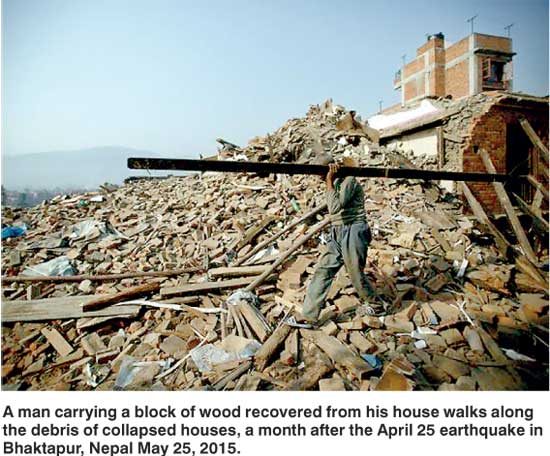Monday Feb 23, 2026
Monday Feb 23, 2026
Tuesday, 26 May 2015 02:30 - - {{hitsCtrl.values.hits}}
NEW DELHI (Thomson Reuters Foundation) - The international community’s response to devastating earthquakes in Nepal has been disappointing, a United Nations official said on Monday, adding that donors were focusing more on reconstruction than much needed aid such as food and shelter.
The impoverished Himalayan nation is reeling from a 7.8 magnitude earthquake which struck on April 25, disrupting the lives of almost a third of the 28 million population.
A second quake of 7.3 magnitude struck on May 12, worsening the situation and further hampering efforts to get aid to survivors in remote regions. Over 8,600 people have died.
“I am disappointed in the sense that there was such an impressive response in terms of search and rescue - all the teams that came  in to do the work, they did very impressively and comprehensively - and maybe they think that’s the job done,” said Jamie McGoldrick, U.N. resident coordinator in Nepal.
in to do the work, they did very impressively and comprehensively - and maybe they think that’s the job done,” said Jamie McGoldrick, U.N. resident coordinator in Nepal.
“The talk now is about reconstruction, but we are trying to remind people that in between search and rescue and recovery, there is a phase called relief and we can’t forget that,” he told the Thomson Reuters Foundation by phone from Kathmandu.
In the weeks following the earthquake, scores of international agencies and foreign governments rushed to send search and rescue teams, doctors and relief materials to the country which is sandwiched between India and China.
The U.N. appealed for $423 million to be able to provide up to two million survivors with basic relief such as tents or tarpaulin sheets, dry food rations, safe drinking water and toilets for the next three months.
As of Monday, the U.N. Financial Tracking System showed $92.4 million has been raised, 22 percent of the required funds.
McGoldrick said the slow response was partly due to donor fatigue where governments were being torn between competing humanitarian crises across the world such as the civil conflict in Syria or in Yemen.
Nepal’s traditional donors were also more “development” focused and were likely holding back funds for long-term reconstruction and recovery projects, he added.
But he warned that there was only a small window of opportunity to buy and get relief supplies delivered to survivors in remote mountain hamlets ahead of the annual monsoons which run from June to September.
The heavy rains in areas which were already damaged by the earthquakes would “complicate relief efforts all the more” as they would trigger more landslides and block roads, hampering the delivery of aid by trucks, he said.
“It only gives us a limited window to get the much needed supplies to the very remote areas, where some people have been very badly affected by the earthquakes,” said McGoldrick.
“We have to make sure that there is enough materials - shelter, blankets, food, water and sanitation.”